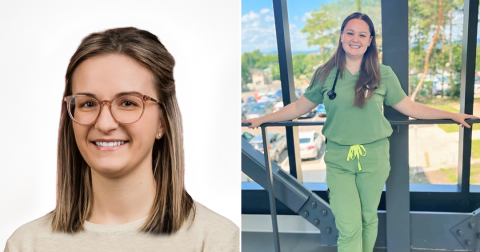Family Medicine Residency: New doctors headed to the Outaouais

In 2025, 923 future medical residents were matched to positions in Quebec through the Canadian Resident Matching Service (CaRMS), including 484 in family medicine – the largest single cohort of future family physicians ever to be trained in the province. In the Outaouais region all 15 available places have been filled, all in family medicine.
This success in the Outaouais region, home to McGill University's Campus Outaouais, is part of a favourable trend in all regions of Quebec. Of the 484 future family doctors, 154 chose to do their residency outside traditional major urban centres like Montreal and Quebec City. These doctors will play a crucial role in improving access to care for Quebeckers living in regions across the province.
Of the 15 new residents in the Outaouais, four completed their MDCM at McGill's Campus Outaouais. Additionally, of the 22 members of the campus’s 2025 cohort, a significant proportion chose to specialize in family medicine, often ranking Gatineau as their preferred location – a statistic all the more significant given that training programs in all other specialties are not offered in the region for residency.
“Even many of those who were aiming for a more isolated setting also listed Gatineau as their first choice,” said Dr. Valérie Guay, a former student at Campus Outaouais and future resident physician in Gatineau. "Gatineau was an obvious choice for my residency. It's where I grew up, where I cared for my first patients. Today, I'm becoming a resident physician here, at home. I'm proud to be able to do all my training in the Outaouais region. It's proof that you can dream big, stay at home and contribute to building positive things for our region.”
According to Guay, the professional advantages of Campus Outaouais are numerous.
"Our cohort is small. Everyone knows each other and people remember us," she explained. “This facilitates the establishment of relationships that are beneficial to patient care and fosters a sense of belonging.
"Access to specialists is more difficult here, so we have to become self-sufficient quickly. We have the opportunity to be very involved right from the start. In fact, colleagues from Montreal used to come to Gatineau for clerkships, and many were impressed by how much we saw, touched and performed. They wanted to stay!”
Gatineau is also attractive for people who have studied elsewhere. Dr. Katherine Desrosiers, who completed her medical studies at Université Laval has also chosen Gatineau for her residency.
“I'm going to miss the people I've worked with in Quebec City over the past few years,” the new doctor said. “But I figure it will give us more to share later on, both professionally and personally!”
For Desrosiers, the relatively small size of the Groupe de médecine de famille universitaire (GMF-U) de Gatineau and its newness attracted her:
"I like being involved in this kind of ‘startup’. The professional involvement is a fuller one. What's more, you gain a great deal of autonomy compared to practising in a big city, where the abundance of specialists limits your possibilities. Here, the family doctor can do more.”
Desrosiers is originally from Gatineau, a determining factor in her choice. For her, the opportunity to give back to her community is of paramount importance.
"Returning to my native region fulfills my desire to serve my community. And you never know: one day, I might have the opportunity to treat the grandmother of my former Grade 3 teacher!”

